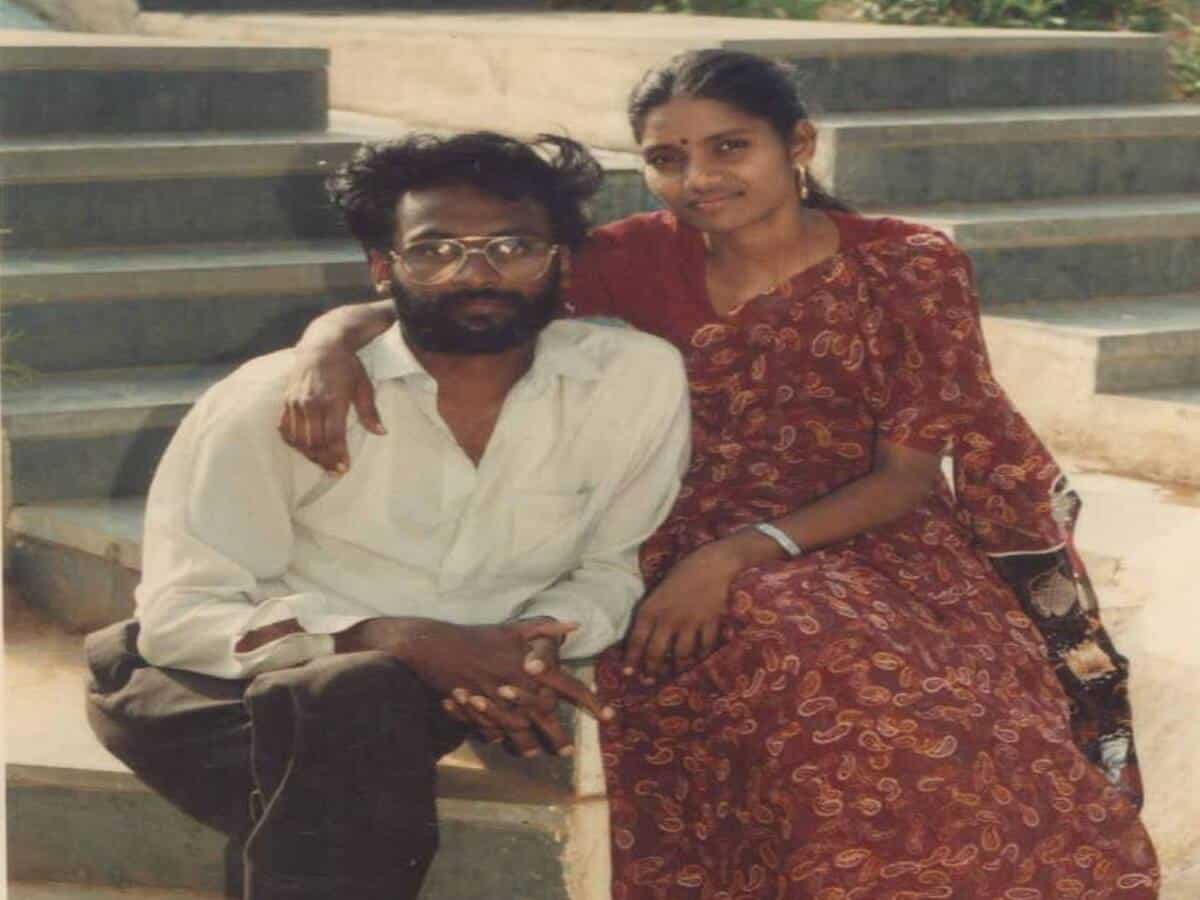
Hyderabad: “I will not cry in front of the jail authorities, come what may. Even a single tear on my cheek, will work as a testimony to the state’s victory which is oppressing my husband. I don’t want that,” says Vasantha Kumari, wife of human rights activist, literature professor and UAPA accused Dr GN Saibaba.
In an hour-long conversation with Siasat.com, Vasantha narrated the agony her husband was put through in the last seven and a half years. With Saibaba now contracting COVID for the second time, the jail authorities are refusing to reveal his medical reports to the family. As such, there is considerable reason to worry for his health and in fact his very right to life.
“I only know that he might be COVID positive because in a letter of his he informed me that he has all the symptoms. The situation looks grim,” says Vasantha.
Perhaps some of Vasantha’s statements are likely to lose their authenticity while translating her account from Telugu to English. However, what is important to note, and far more important to preserve in our memories is that Vasantha, just like her husband, carries within herself a courage she has painfully cultivated. The kind of courage which is highly irregular in the current heating political climate but somehow the couple has successfully normalised.
For the last seven years, Vasantha has made countless trips to Nagpur’s Central Prison to meet her husband. She is living off of whatever financial help friends and colleagues have been kind enough to offer her. Aside from that, she works as a part-time typist to fend for herself. As Vasantha speaks continually, with occasional pauses to take a sip of water, she is neither agitated nor melancholic. Neither is there any trace of flamboyant rhetoric. She is calm, grounded and resolute.
Even as her future seems bleak, she is unwilling to let go of the resolve she has so meticulously built up. “Idanta meeku chepaddam kuda kashtame. Kaani chepakunda ela undali?” (Saying all this to you is difficult. But how do I stop speaking?) she asks.
Dr Gokarakonda Naga Saibaba has been languishing in Nagpur’s Central prison since 2017 despite repeated appeals to the court to release him. He has been charged with the draconian Unlawful Activities (Prevention) Act and the professor now firmly believes that he is likely to remain in jail until the end of his days.
“He wrote to me after Father Stan Swamy passed away. He said that one day I might read about his passing as well if the jail authorities don’t pay attention to his health. He wasn’t sad about his jailing or even his health, but each time I narrate the contents of his letter to friends, they find themselves filled with grief and helplessness,” adds Vasantha.
The jailed professor’s statements hold a lot of truth especially if one were to consider the fact that even on health grounds his bail and his parole were rejected twice and thrice respectively.
Saibaba is in jail for his alleged links with banned extreme left organisations. While he was granted bail after his initial arrest in 2014, he was sentenced to life imprisonment in 2017 for connections with the banned Revolutionary Democratic Front (RDF), an organisation linked with the banned Communist Party of India (Maoist). Despite his repeated denial that he had nothing to do with the banned organisation, he was charged under Sections 13, 18, 20, 38 and 39 of the UAPA and Section 120 B of the Indian Penal Code.
Irrespective of whether or not Dr Saibaba colluded with the Maoists, there is no doubt about the fact that the treatment meted out to him currently is deeply inhumane.
The legacy of Dr GN Saibaba:
Speaking to The Hindu in July 2015, Dr Saibaba discussed Operation Green Hunt, a military offensive launched by the then Congress government in 2009 with the sole aim of crushing Maoist rebels across the tribal belt of India.
“I have been to almost every Adivasi district. It wasn’t that difficult for a physically challenged person like me. The Adivasis took me on their shoulders and walked me up to the hilly forests,” he had said.
“I gathered enough evidence that suggested the ruling class wanted access to their resources no matter what. So Operation Green Hunt was launched to kill, maim and dislodge these people.”
As Vasantha further notes while speaking to Siasat.com, her husband was deeply disturbed by the ruthless manner in which the huts of Adivasis in the central Indian tribal belt was burnt. “Vaalu gudiselu kalchestaru, food lo kerosene posestaru, mahilalanu rape chestaru (They the state police, would burn the huts of Adivasis, pour kerosene in their food and rape women.)” she adds.
Dr Saibaba’s national campaign against Operation Green hunt caused several international investors to withdraw investments from the tribal belt. As he has mentioned in the past, the professor believes that to be the reason for his incarceration.
State’s apathy amidst Saibaba’s deteriorating health:
Dr Saibaba’s health would be a matter of concern even with access to good medical facilities. “His left hand was damaged in a scuffle and has ceased to work because of a condition called brachial plexopathy. The condition has now spread to his right hand owing to lack of treatment, and even that has started to shiver,” Vasantha added.
As per his wife’s statements, GN Saibaba, who’s paralysed from waist down owing to a polio infection, used to travel across the country and abroad seamlessly. Currently, he can not take the spoon to his mouth to feed himself with ease, as his right hand starts shivering. “If he wants to lie down, jail workers have to help him. He cannot visit the loo, bathe or even get up without proper aid,” she added.
Afflicted with countless health ailments like joint pains, hypertension, an earlier cardiac arrest and stones in his gallbladder and kidney, there is little respite for Saibaba. Vasanthi further said that there exists a cyst in his brain and a lump in the left side of his abdomen which has made it difficult for him to function. “He deals with shooting pains on a regular basis,” said Vasanthi in a matter of fact tone, almost in a rote manner, having had to repeat the struggles her husband went through for the umpteenth time.
The life-saving medicine provided for Dr Saibaba was also funded by his wife and friends. “Ideally jail authorities should have provided it themselves, but they didn’t.”
The mind of Vasantha Kumari:
When asked about her mental state, Vasantha laughed and after the briefest of pauses said that she has known her husband since they were in 10th grade.
“We got married in 1991. It is hard to think of all that he is going through. Even me narrating all this to you is not easy. Once, when I went to visit him in jail, the jail authorities did not let me meet him. They said they were taking him to the hospital and so I waited outside the main gate of the jail. As the convoy with Sai in it, crossed the gate I started to shout. Until then Sai did not know, that I was there. I went to the hospital and waited there for five hours. I didn’t go for lunch, or even to use the restroom in case I miss my chance to meet him. Ideally when someone is in the hospital, even if it is a prisoner, they should let the family meet the patient. But we were treated with a lot of cruelty,” she said.
Even though they managed to meet the next day after the incident, the memory of police cruelty stays with Vasantha till now.
Even during the pandemic in 2020, phone calls were restricted and post offices were shut. So I couldn’t stay in touch with him. “Jail ki velithe mulakhat jaraganivaledu vaalu,” (Even if I went to the prison, they wouldn’t allow me to meet him.)
Detaching from her narrative, Vasantha also mentions how along with her, countless other families were prevented from meeting their loved ones imprisoned in the Central jail.
“Prati saari santhoshangane velthanu Sai ni kalavadaniki. Kaani nirasha okkate kalustundi.” (Each time I go to meet Sai I am happy, but invariably since they don’t allow me to meet him, I am met with disappointment.)
Vasantha tried repeatedly to get her husband out on bail owing to his health condition and fear of the pandemic. She wrote to the erstwhile Maharashtra home minister Anil Deshmukh and to the jail authorities but her pleas amounted to nothing.
“They keep saying he is a threat to the democracy of the country. What can a man who is lacking basic limb functions do? People like Pragya Thakur are out on bail after admitting proudly in the courts that they were guilty of terrorist acts. Why is my husband, who has done no harm still in jail?” she asks.
Vasantha further remarks that so far he has been surviving owing to his faith in the public and his determination. Discussing one of his letters, she recollects how he said, “Nenu chavuni nirakarsithanu” (I refuse to succumb to death).
When asked where she finds her strength she plainly states, “Anyayam chaala rojulu gelavadu. (Injustice doesn’t last for too long.)
The language of silence:
Perhaps another distressing part of Vasantha’s account was how language proved to be such a dreadful barrier. “In the jail, they would not allow us to speak in Telugu because they don’t know the language in Maharashtra. I don’t know English very well. So I would speak in Telugu and he would reply in English. If by mistake, he uttered something in Telugu we were not allowed to talk even though we only got 20 minutes to begin with.” she says.
Viewing the language and the alienation as a road block, Vasantha tried to get her husband transferred from Nagpur prison to Hyderabad’s Cherlapally Central jail under the Transfer of Prisoners act, 1950 but the state responded with radio silence.
Literature: The sole respite
“Now he just reads the books I send him. While I don’t know what he is reading at the moment, he asked for The Early Indians by Tony Joseph, The Anarchy by William Dalrymple, Perumal Murugan’s Amma and the collected poems of John Keats,” she states
But going by Vasantha Kumari’s narrative, Dr GN Saibaba speaks highly of Urdu communist poet, Faiz Ahmed Faiz. He also translated some of Faiz’s poetry into Telugu in the letters to his wife.
Dr Saibaba told his wife that each time he reads Faiz, he feels like his thoughts have found a form. With the darkness shrouding around the couple (and in fact over all the victims suffering under UAPA), snippets from literature seem to be the sole solace Dr Saibaba finds.

